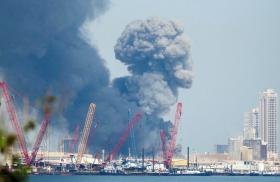- Policy Analysis
- PolicyWatch 4103
As the Renaissance Dam Comes Online, the U.S. Mediation Role Needs Clarity
Ethiopia, Egypt, and Sudan were unable to agree on crucial water-sharing rights in the fraught years leading up to the GERD’s inauguration, raising the specter of escalating tensions unless the Trump administration engages more actively.
On September 9, the Grand Ethiopian Renaissance Dam (GERD) was inaugurated after more than a decade of negotiations failed to stop construction of the controversial project or reach downriver water-sharing agreements with fellow Nile River countries Egypt or Sudan. The $5 billion dam has an official capacity of 5,000 megawatts, which if sustained could provide ample power to electricity-starved Ethiopia while leaving additional amounts for export. Now that it is fully operational, however, the GERD could spark crises with Cairo and Khartoum as they face potential water shortages or flooding from uncoordinated releases. Egypt immediately sent a letter to the UN Security Council warning that it “will not allow Ethiopia to impose unilateral control over shared water resources.” Yet Cairo and Khartoum have lost substantial leverage now that the project is completed.
In Washington, President Trump referenced the dam in a June statement listing conflicts that his administration is working to resolve, but there has been little sign of significant U.S. mediation since then (see below). If the president does in fact see the GERD dispute as a situation ripe for American involvement, he will need to orchestrate a series of diplomatic steps to resolve various disagreements, particularly between Cairo and Addis Ababa.
Conflicting Views on Nile Water Rights
Soon after Sudan gained independence, it adopted a water-sharing agreement with Egypt in 1959. Yet Addis Ababa has long disputed that arrangement and argued for its sovereign right to build the GERD, in part because the Blue Nile receives approximately 85 percent of its water from Ethiopia. (The Blue Nile is the river’s main eastern tributary and largest water source.)
Egypt sees the dam as a direct threat to its national security because it depends on the Nile for more than 90 percent of its water needs—though estimates suggest that the country loses roughly 20-25 percent of its water due to inefficient management alone. Water shortages will only be aggravated in the coming years by growing population numbers and climate change. In particular, Cairo fears that its supplies will be reduced by Ethiopia unilaterally operating the dam and filling its massive reservoir, which could threaten Egypt’s agriculture, drinking water, and, by extension, social stability. Such fears are especially acute given the prospect of what Addis Ababa might do during periods of drought. Cairo therefore wants a binding legal agreement that regulates reservoir filling and other operations to ensure no harm is done to Egypt’s vital interests.
For its part, Sudan initially saw the GERD as an opportunity to regulate water flows and reduce floods. Later, it expressed technical and security concerns related to the dam’s safety and potential impact on Sudanese water facilities. These issues and the lack of coordination with Ethiopia eventually pushed it closer to Egypt’s position.
In the years since Ethiopia began constructing the dam in 2020, gradually filling its reservoir, and bringing the first turbines online in 2022, GERD operations have not affected Sudan or Egypt—in part because the rainy seasons have been consistent during this period. But when conditions inevitably change, Addis Ababa could decide to alter its management of the dam in ways that constrict the Nile’s flow.
Past Negotiations, New Reactions
Mediation of the GERD dispute has gone through multiple stages over the years, including a 2015 joint declaration of principles, a 2019 U.S. effort facilitated by the Treasury Department and World Bank, and a renewed effort by the African Union (AU). When Ethiopia left the U.S.-sponsored negotiations in 2020, Treasury officials noted that “final testing and filling should not take place without an agreement.”
For a time, Cairo and Khartoum put the issue on the back burner amid civil war in Sudan and the regional tumult spurred by the Gaza conflict. Yet the dispute has been brought back to a boil now that they face the reality of a fully operational GERD. Egypt’s most senior officials have repeatedly called the dam’s construction a “red line” and an existential threat, while Foreign Minister Badr Abdelatty apparently raised the issue during his recent trip to Washington. No U.S. commitments were evident from that visit, however (see below).
In Ethiopia, nationalist sentiment soared when the dam was completed, especially after President Trump falsely claimed that the United States had funded its construction. During the opening ceremony, Prime Minister Abiy Ahmed heralded the country’s achievement and stated that the dam was “absolutely not to harm its brothers”—which could be interpreted as an opening to new talks with Egypt and Sudan or just a way of limiting international criticism.
What Should Washington Do Now?
President Trump has alluded to the GERD dispute several times this year. In mid-July, he stated, “If I am Egypt, I want to have water in the Nile...[W]e are working on that...[It’s] going to get solved.” He has also described the dam as “closing up water going to the Nile,” called the river “a very important source of income and life,” and expressed confidence that the issue would be resolved “very quickly.”
Yet there is no evidence that senior administration officials are working to resolve the dispute. The public readout of Secretary of State Marco Rubio’s July 30 meeting with Abdelatty did not mention the dam, only Sudan’s “transition to civilian governance” and the general effort to promote regional “peace and security.” The readout of Rubio’s July 22 phone call with Prime Minister Abiy did not directly reference the GERD either, which many regional analysts interpreted as Washington avoiding mediation. In mid-August, Sudan’s President Abdel Fattah al-Burhan had a lengthy meeting with U.S. envoy Massad Boulos in Geneva, but they reportedly focused on resolving the civil war, not the GERD dispute.
Threats against Ethiopia have likewise proven ineffective in addressing the issue. When Addis Ababa walked away from the U.S.-sponsored talks in 2020, the first Trump administration cut $300 million in aid, but the project continued unabated. (Notably, U.S. aid later rose to well over $1 billion. This year, Washington has contributed at least $340 million in food assistance to northern Ethiopia despite the administration’s significant foreign aid reductions and closure of the U.S. Agency for International Development.) As for Egypt’s past threat to attack the dam, this option is no longer realistic given the massive flooding it would cause at home, not to mention the recriminations and potential blowback over taking such action against a sovereign state.
Going forward, President Trump’s expressed interest in addressing the dispute is welcome given GERD’s potential impact on U.S. interests—the most significant of which is potential water shortages that could exacerbate Egypt’s economic struggles and threaten its stability. As in past negotiations, resolving the situation will require the following:
- Drafting an updated version of the 2015 declaration of principles, including agreements on fair usage and water release management.
- Coordinating transparent data-sharing on water usage.
- Providing technical guarantees on reservoir filling and release operations.
Without these steps, the dam will likely remain a source of tension.
Resolving the GERD dispute may also entail addressing a complicated combination of other diplomatic and security issues. As a landlocked state, Ethiopia regards opening a port as an existential issue, but it has been unable to achieve this through bilateral negotiations with Eritrea, Somalia, or Somaliland; indeed, Mogadishu has rejected and scuttled any Ethiopian deals with Somaliland. In January, however, Somali officials restored relations with Addis Ababa in a process mediated by Turkey, so they may be more inclined to reach a port deal. Meanwhile, Egypt is in the process of deploying 10,000 troops to Somalia to bolster the AU mission there and help fight the U.S.-designated terrorist group al-Shabab. Some in Ethiopia view this deployment as a threat, and Egypt’s military presence could block further rapprochement between Addis Ababa and Mogadishu.
The Trump administration could help untangle these knots by guaranteeing Ethiopian port access through Somalia in exchange for a negotiated resolution of Nile water supplies to Egypt and Sudan. Somalia and Ethiopia could also be granted development funds to improve electricity distribution networks, either through bilateral U.S. loan guarantees or by encouraging the World Bank and African Development Bank Group to establish a program toward this end. (The latter organization has already invested in several electricity modernization initiatives in both countries.) In each case, Washington should work closely with the AU Commission, whose current chair, Mahmoud Ali Youssouf, urged Egypt, Ethiopia, and Sudan to return to negotiations during his speech at the dam’s opening. Without U.S. diplomatic intervention, the dispute is ripe for escalation.
Areig Elhag is the Arabic content editor at The Washington Institute and former producer of the award-winning television program Between Two Niles. Ben Fishman is the Institute’s Steven D. Levy Senior Fellow and former director for North Africa at the U.S. National Security Council.




